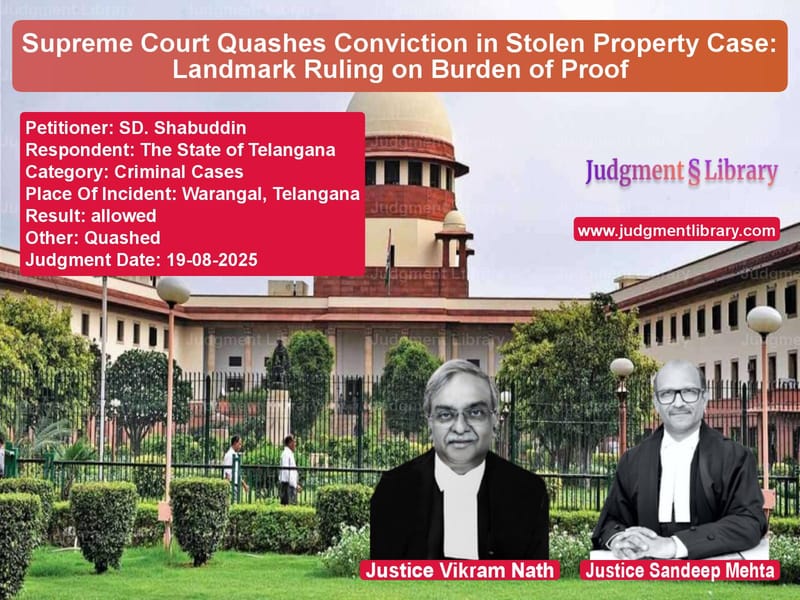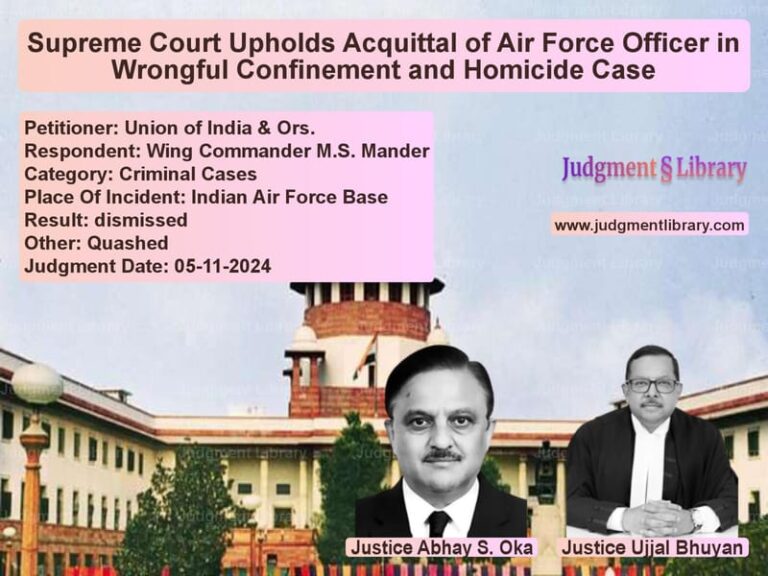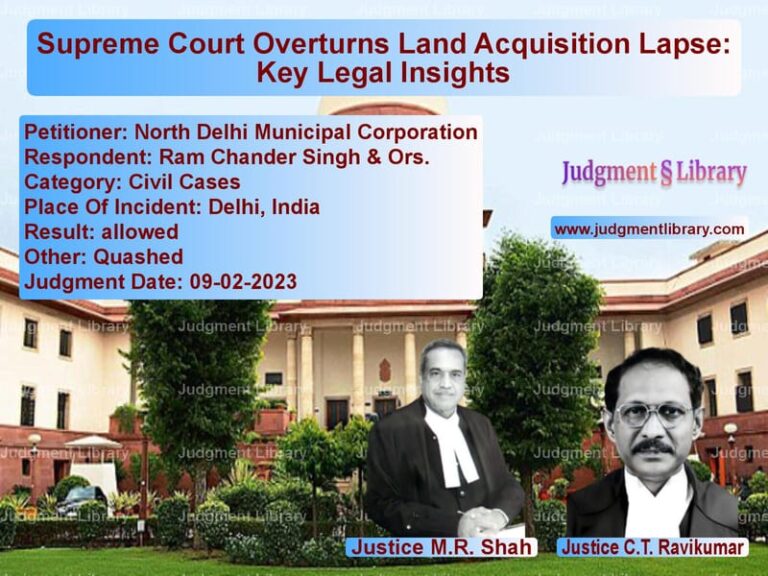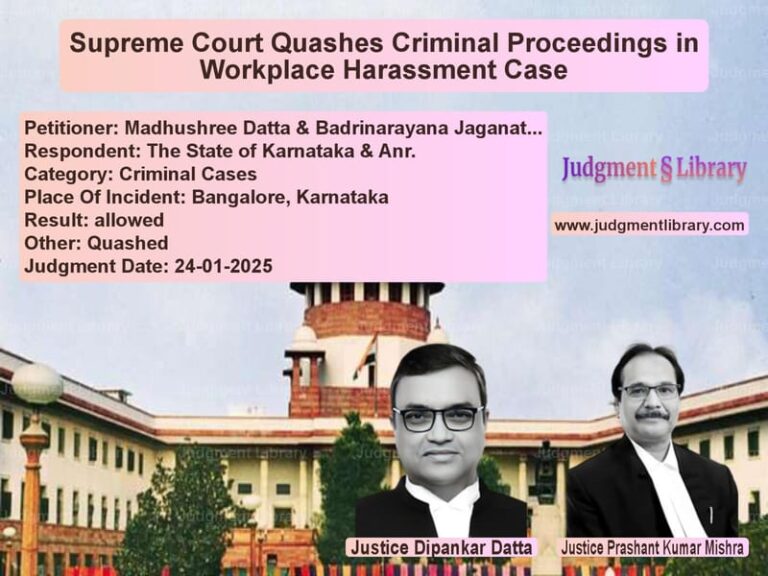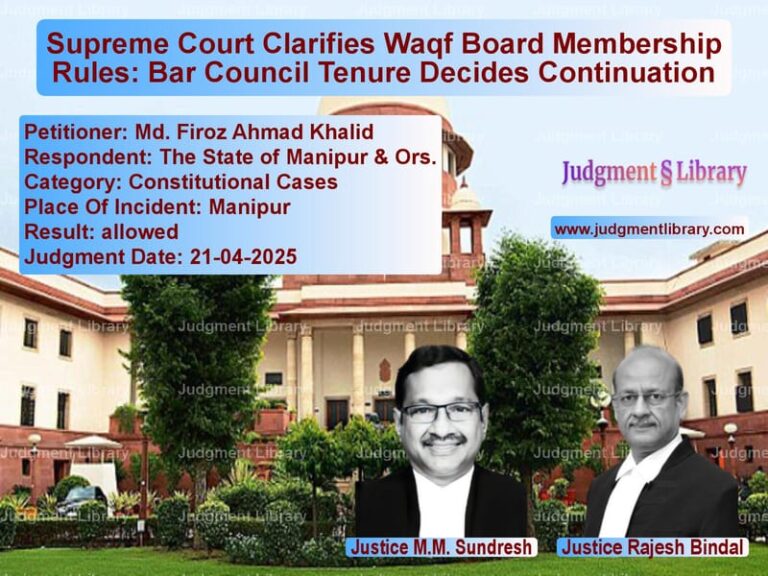Supreme Court Quashes Conviction in Stolen Property Case: Landmark Ruling on Burden of Proof
The Indian judicial system stands firmly on the principle that every accused person is innocent until proven guilty, and the burden of proving guilt beyond reasonable doubt rests entirely on the prosecution. This fundamental tenet of criminal jurisprudence was recently reaffirmed by the Supreme Court of India in a significant judgment that overturned the conviction of a man accused of handling stolen property. The case of SD Shabuddin versus the State of Telangana not only highlights the importance of proper evidence in criminal trials but also clarifies the legal requirements for convicting someone under Section 411 of the Indian Penal Code.
The Mysterious Disappearance and Initial Investigation
The case originated from the tragic disappearance of M Narsalah, a paddy businessman from Warangal. On December 22, 2005, Narsalah had traveled to Warangal to collect outstanding dues amounting to approximately Rs 2.92 lakh from various rice mills. His last known communication was a phone call to his brother-in-law around 7:00 PM, where he mentioned that he had collected the cash and was proceeding to Laxmi Narsimha Rice Mill. When attempts to contact him failed later that evening, with his phone eventually being switched off, his family grew concerned and filed a missing person report. Two days later, on December 24, 2005, a formal FIR was registered, setting in motion a police investigation that would span several months.
The Prosecution’s Theory of Crime
The prosecution constructed a narrative of business rivalry gone wrong. According to their theory, Narsalah had previously worked as a Gumasta (manager) for Moulana, a prominent paddy broker. After gaining experience, Narsalah started his own independent paddy business, which allegedly prospered rapidly, eventually surpassing Moulana’s business and causing him significant financial losses. The prosecution claimed that this business competition turned into bitter enmity, particularly after the two had a recent altercation about pricing strategies.
The prosecution alleged that on December 22, 2005, Moulana saw an opportunity to eliminate his business rival. After spending time together and consuming alcohol, Moulana supposedly took Narsalah to the Ursa Hillock area, where he murdered him by slitting his throat. The prosecution claimed that Moulana then stole the cash Narsalah was carrying, along with his motorcycle and mobile phone. To dispose of the evidence, Moulana allegedly parked the motorcycle at Warangal Railway Station and disposed of the mobile phone in a train’s bathroom.
The prosecution further claimed that the next day, December 23, 2005, Moulana enlisted the help of the present appellant, SD Shabuddin, offering him Rs 30,000 to assist in disposing of the body. According to this theory, both accused retrieved the body, wrapped it in a polythene sheet, and while traveling towards Khammam, came across a burning pyre in Appalraopet. Taking advantage of the situation, they allegedly threw the body onto the burning pyre to destroy the evidence completely.
The Trial Court’s Surprising Verdict
The Trial Court, after examining 31 witnesses and reviewing 40 documents along with 3 material objects, delivered its judgment on March 5, 2010. In a somewhat unexpected ruling, the court acquitted both Moulana and Shabuddin of all major charges, including murder (Section 302 IPC), destruction of evidence (Section 201 IPC), and theft (Section 379 IPC). The court found that the prosecution had failed to establish a complete chain of circumstances that would point conclusively to the guilt of the accused for these serious offences.
However, in a contradictory finding, the Trial Court convicted both accused under Section 411 IPC for dishonestly receiving stolen property. This conviction was based solely on the recovery of Rs 2,60,000 from Moulana and Rs 25,000 from Shabuddin. The court held that since the accused could not satisfactorily account for their possession of such large sums of money, they must be guilty under Section 411 IPC. Both were sentenced to three years of rigorous imprisonment and a fine of Rs 5,000 each.
Read also: https://judgmentlibrary.com/supreme-court-quashes-dowry-case-against-father-in-law-after-divorce/
The High Court’s Decision and Further Appeal
Both convicts appealed to the High Court of Telangana at Hyderabad. During the pendency of this appeal, Moulana passed away, and his legal representatives were brought on record. The High Court, in its judgment dated March 7, 2024, partly allowed the appeal by reducing the sentence from three years to one year but maintained the conviction under Section 411 IPC. Dissatisfied with this outcome, SD Shabuddin approached the Supreme Court through a special leave petition, which eventually became the subject of the present appeal.
Arguments Before the Supreme Court
Before the Supreme Court, the appellant’s counsel presented compelling arguments challenging the conviction. The counsel strenuously urged that “the prosecution has failed to prove beyond reasonable doubt that the property held by the appellant is a stolen property, and belonged to the deceased.” He emphasized that “to bring home the charges under Section 411 IPC, the prosecution must establish that the person receiving or retaining the stolen property must have knowledge or belief that the same is a stolen property.” The counsel further argued that “mere possession of the stolen property is not enough, and it must be proved by the prosecution that there was knowledge about the property being stolen. Hence, the belief or knowledge factor is sine qua non to give a finding of guilt for offence punishable under Section 411 IPC.”
The appellant’s counsel also highlighted the legal inconsistency in the lower courts’ judgments, pointing out that “in the present case, the prosecution has failed to prove that the appellant had either knowledge or belief that the money that he had received from accused-Moulana was stolen property. This assertion is further fortified by the concurrent acquittal of both of the accused persons under Section 379 IPC by the High Court and the Trial Court. As both of them were acquitted for the offence of theft, the Courts below grossly erred to return a finding that the appellant was guilty for dishonestly receiving stolen property under Section 411 IPC.”
The State of Telangana, represented by its counsel, vehemently opposed these submissions. The respondent’s counsel contended that “the appellant was offered Rs. 30,000/- by the accused-Moulana for disposing of the dead body of the deceased. The accused-Moulana offered said sum of Rs. 30,000/- from Rs. 2,92,629/- which belonged to the deceased.” The counsel further argued that “the appellant has suffered a confessional statement on the basis of which recovery was made. The appellant led the investigating officer (PW-30) to his house, where he had produced Rs. 25,000/- in the form of cash. The appellant had also confessed that out of Rs. 30,000/- which was his share as agreed with accused-Moulana to commit the illegal act of disposing of the dead body of deceased, he had already spent an amount of Rs. 5,000.” On these grounds, the state counsel urged the Court to dismiss the appeal and uphold the conviction.
The Supreme Court’s Landmark Analysis
The Supreme Court bench comprising Justices Vikram Nath and Sandeep Mehta delivered a comprehensive judgment addressing two crucial legal issues that arose in the case.
Reverse Burden of Proof: A Fundamental Error
The Court first examined whether the High Court had erroneously placed a reverse burden of proof upon the appellant. The Supreme Court noted that the High Court had applied the presumption under Section 114 of the Indian Evidence Act, particularly illustration (a), which states that “a man who is in possession of stolen goods soon after the theft is either the thief or has received the goods knowing them to be stolen, unless he can account for his possession.”
The Supreme Court firmly rejected this approach, holding that “the High Court has grossly erred by placing reverse burden of proof on the accused to account for the cash in their possession.” The Court explained that “the aforesaid illustration would only apply where the prosecution establishes the foundational fact of the theft of goods and the possession thereof by the accused soon after the incident.” In this case, the Court found that “there is no evidence on record as to the total amount which the deceased was carrying with him when the incident took place. In absence of any convincing evidence regarding the amount being carried by the deceased, by the mere fact of recovery of a cash amount of Rs.25,000/- from the possession of the accused, it cannot be inferred that the said amount was stolen goods.”
The Court emphasized the fundamental principle of criminal law that “in a criminal prosecution, the initial burden is always on the prosecution to discharge, whereby the allegations raised by it against the accused person are preliminarily satisfied. If the prosecution is unable to do so, by virtue of Section 102 of Evidence Act, the criminal trial initiated against the accused deserves to be dismissed without asking the accused to lead any evidence from the side of defence.”
The Supreme Court concluded that “to base a conviction under Section 411 IPC solely on the ground that both the accused were unable to account for being in possession of such huge amount of cash is both incorrect and untenable. Therefore, the approach adopted by the High Court in upholding the order of conviction of Trial Court for inability of the accused to account for the cash so recovered from their possession is alien to the criminal jurisprudence of our legal system.”
The Legal Inconsistency in Conviction
The second crucial issue addressed by the Court was whether a conviction under Section 411 IPC could be sustained when both accused had been acquitted of the primary offence of theft under Section 379 IPC. The Supreme Court analyzed the essential ingredients of Section 411 IPC, referencing its earlier judgment in Shiv Kumar v. State of Madhya Pradesh, where it had noted that: “The penal section extracted above can be broken down into four segments, namely : Whoever, (i) dishonestly; (ii) receives or retains any stolen property; (iii) knowing; or (iv) having reason to believe the same to be stolen property, shall be punished with imprisonment of either description for a term which may extend to three years, or with fine, or with both.”
The Court reasoned that “to establish culpability under Section 411 IPC, it must be proved that the accused had dishonestly received or retained the stolen property and in doing so, he either had knowledge or reason to believe that the same is a stolen property. The natural corollary being if the courts upon trial reach a conclusion that the property in question is not a stolen property, therefore, the accused cannot be charged for the offence punishable under Section 411 IPC especially when the whole case of the prosecution relates to the events forming part of the same transaction.”
The Court highlighted the fundamental legal inconsistency in the lower courts’ approach: “Since the very beginning, the case of the prosecution is that accused-Moulana committed the homicide of the deceased, stole his belongings, including the sum of Rs. 2,92,629/… During the trial, the Trial Court has outrightly rejected this theory of theft, against which no appeal till date has been preferred by the prosecution or the complainant before the High Court.”
The Supreme Court expressed its inability to comprehend the Trial Court’s reasoning, stating: “Therefore, once the Trial Court has acquitted both accused-Moulana and the present appellant under Section 379 IPC, we fail to understand how the Trial Court reached a conclusion that the accused persons are liable under Section 411 IPC. In order to uphold conviction under Section 411 IPC, it is sine qua non that the property in the possession of accused is a stolen property. If the property is not a stolen property, the charge under Section 411 IPC cannot be sustained.”
The Court concluded emphatically on this point: “Hence, when both the Courts below reached a conclusion that there is no commission of theft on the part of the accused persons, there arises no question of them committing an offence of dishonestly receiving a stolen property punishable under Section 411 IPC. In our view, the High Court has committed grave error in upholding the order of conviction of the present appellant under Section 411 IPC.”
Final Judgment and Acquittal
Based on its analysis, the Supreme Court allowed the appeal and set aside the judgment of the High Court dated March 7, 2024. The Court acquitted SD Shabuddin of all charges and discharged his bail bonds. The judgment serves as a significant precedent reinforcing fundamental principles of criminal jurisprudence, particularly the prosecution’s inalienable burden to prove its case beyond reasonable doubt and the requirement for logical consistency in court verdicts.
This ruling underscores that convictions cannot be based on presumptions or legal inconsistencies, and that the rights of the accused must be protected against improper shifting of the burden of proof. The judgment clarifies that an acquittal for the primary offence of theft necessarily precludes a conviction for handling the proceeds of that same theft, as the property cannot simultaneously be both stolen and not stolen in the eyes of the law.
Petitioner Name: SD. Shabuddin.Respondent Name: The State of Telangana.Judgment By: Justice Vikram Nath, Justice Sandeep Mehta.Place Of Incident: Warangal, Telangana.Judgment Date: 19-08-2025.Result: allowed.
Don’t miss out on the full details! Download the complete judgment in PDF format below and gain valuable insights instantly!
Download Judgment: sd.-shabuddin-vs-the-state-of-telanga-supreme-court-of-india-judgment-dated-19-08-2025.pdf
Directly Download Judgment: Directly download this Judgment
See all petitions in Theft and Robbery Cases
See all petitions in Evidence Law
See all petitions in Judgment by Vikram Nath
See all petitions in Judgment by Sandeep Mehta
See all petitions in allowed
See all petitions in Quashed
See all petitions in supreme court of India judgments August 2025
See all petitions in 2025 judgments
See all posts in Criminal Cases Category
See all allowed petitions in Criminal Cases Category
See all Dismissed petitions in Criminal Cases Category
See all partially allowed petitions in Criminal Cases Category

